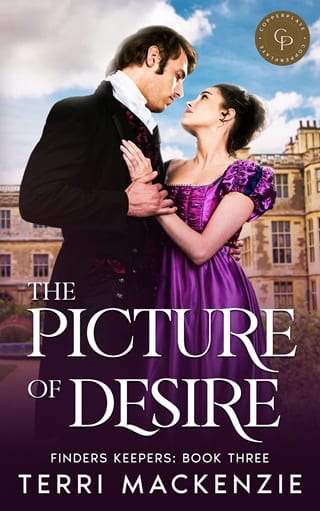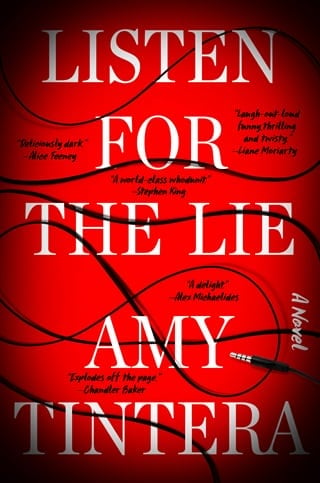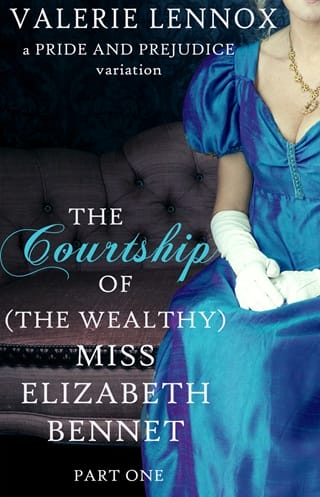Chapter Thirteen
THE PAST
September 1804
Louisa watched as Worthington Hall came into view, its imposing golden front illuminated by the autumn sun. Beside her in the carriage, her mother fussed and tittered at the sight of the grand house. The invitation had not been a surprise, especially to Louisa who had done her best to secure it, but naturally, her mother had thought of one thing and one thing only.
Marriage.
As far as her mother was concerned, and to Louisa's disgust, this was merely another opportunity to secure a husband.
"You must be on your best behaviour," Mrs Picard said, smoothing down her skirts for the umpteenth time. "Do you hear me? No talking of your painting. And if a gentleman singles you out, for heaven's sake encourage them."
With no interest in marrying, Louisa had thus far made a habit of flirting only with gentlemen she perceived to be disinterested in marrying her. It was a useful exercise in how to flirt, which she viewed as being of the utmost importance.
Marriage was less so, and precisely for the reasons her mother had outlined.
No talking of your painting.
Thank heavens Henry would be attending. There was a gentleman who spoke to her as an equal, as though her love of painting was not so much unusual as fascinating. She had, tragically, concluded that he would not kiss her, but she found pleasure in conversation. He'd told her about his home in Kent, at his father's seat, and his friendship with the duke's son at the neighbouring estate. In return, she had told him about her childhood and the landscapes that had first inspired her love of art.
"Are you listening to me, Louisa?" her mother demanded.
Her father sighed. "Leave her alone, Margaret. She's only a girl."
"She's eighteen, Harold. When I was her age, we were married."
Louisa toyed with the buttons on her gloves. Why her mother wanted her to engage in the same miserable life choices her parents had made, she didn't know. They had married each other for entirely the wrong reasons: her mother had married him for his wealth and position, and her father had been bewitched by her pretty face. When her mother's beauty had faded and her father had demonstrated all the many ways he disliked being fashionable, there was nothing left but resentment.
"Louisa," her mother snapped. "Take that mulish expression off your face. You know why we are here, and it is not so you can scowl in a corner or conspire to escape the opportunities I have provided for you."
Louisa resisted rolling her eyes with difficulty. If there was one thing she had learnt from eighteen years in her mother's company, it was that it was best to choose the battles she fought. This was not worth the inevitable casualties.
"Margaret," her father said now, wearied patience in his voice. "Leave her be. She will hardly flourish if you deprive her of light and water."
Her mother's mouth twisted viciously. "She is not a plant."
"And yet she may flower just the same if you but gave her an opportunity."
"I give her ample opportunity. If you encouraged her to be a lady instead of indulging her love of oils, she may actually find herself a husband."
"Is my marriage the only virtue you believe me to be capable of?" Louisa demanded.
"What else is there?" her mother asked dismissively. "Consider what you might do for this family if you but put your mind to it. Think of the match you might attract if you used your charms to good effect rather than flirtations."
"Now, Margaret," her father said. "If I recall correctly, you were not averse to a little flirtation in your time, either."
" I did not marry a title," her mother said pointedly, and they lapsed into silence like collapsing earth. Louisa felt as though she might suffocate in it, and the moment they arrived, she escaped into the east drawing room.
Many of the guests had already assembled here, and she took the tableau in at a glance. Most ladies were gathered together, talking, their mothers keeping a watchful eye on them. The gentlemen were in a similar group. Some played cards with the young ladies—it looked like a particularly boisterous game of loo. A few gentlemen, evidently bored with the proceedings, appeared to be reading. And in the corner, two young gentlemen played a game of chess.
They happened to be sitting below the window, and a shaft of early autumn sunshine fell upon them, gilding them and casting them into focus. Henry Beaumont, Viscount Eynsham, and his friend Mr Comerford, son of Viscount Worthington. The two young men appeared entirely captivated by their game and mindless to the chatter that arose around them.
Louisa felt the breath rush from her lungs even as her mother came to her elbow. "Not that boy," she said sharply, taking Louisa's arm and steering her bodily away from the vision in sunlit gold. "I know you have developed a particular liking for him to spite me, but it will not be worth the pain of it, I assure you."
"I have not developed a taste for any gentleman to spite you, Mama."
Her mother's brown eyes, sharp from a lifetime of shrewishness, fixed on her. "You are my daughter, so I will pay you the compliment of not assuming you are stupid. All I ask is you do the same in return."
Louisa smiled impishly. "I have not developed a taste for any gentleman only to spite you," she corrected, and her mother's lips thinned.
Over my dead body," she said. "And believe me when I say I have no intention of dying just yet."
Although Henry had known Louisa would be attending—Comerford had persuaded his father to invite the family—it transpired there was a difference between knowing and seeing her enter the room. It was as though her presence sucked the oxygen from the room.
Comerford moved his bishop. "Say the word and I'll separate her from the pack."
Henry shook his head. "Her mother doesn't approve."
"And? She's truly lovely—a diamond in a room of quartz."
"How poetic of you," Henry said, taking a pawn with his rook.
"Poetic is hardly out of the ordinary for me." Comerford raised his arms over his head and stretched languidly. "Besides, I was feeling dramatic."
" That certainly isn't out of the ordinary."
Comerford gave him a dry look and took his rook. "Let's return to the subject of a certain young lady."
"There's no point."
"A harmless flirtation never hurt anyone."
If that was all it was, then perhaps he would be tempted to agree, but even now, Henry knew there was nothing ‘harmless' about Louisa. She had infiltrated his thoughts and his peace of mind; she was a temptation he hardly knew how he was going to resist.
Two weeks in Bath of fighting his attraction to her, pretending in public he felt nothing when all he wanted was to see her laugh, had worn him down. The strength of his feelings had taken him utterly by surprise, but underneath this need to secure her happiness were other, entirely more sordid emotions.
It was a good thing she had abandoned her quest of convincing him to kiss her, or he would have inevitably given in.
The thought made his lips pinch.
"You're looking disagreeable again," Comerford commented.
"An association with her would be fruitless." Henry moved his queen. "Check."
Comerford moved a knight to protect his king. "How so?"
Henry scowled and moved his queen one square to the left. "Do you need a list of reasons? Her mother is eager for her to marry anyone but me—I'm too young and too poor to offer her any meaningful prospect."
"And the lady?" Comerford took Henry's remaining bishop with his own. "What are her inclinations?"
"From what I can tell, she has no inclination to marry at all, or at least not soon." Henry took Comerford's bishop with a pawn. "And even if she had some inclination towards me, we would still face all the aforementioned issues."
Comerford shrugged and placed his queen diagonally to Henry's king. "Men have gone to war for less," he said. "Checkmate."
Across the room, Louisa tipped her head back and laughed throatily. Unable to help himself, Henry glanced at her and for a heated moment, their eyes met. Seeing her surrounded by young gentlemen was like swallowing a shard of glass and feeling it lodge in his navel.
He had known, of course, that she was a flirt and popular with other gentlemen, but as he had so recently discovered, there was a difference between knowing and seeing.
If her goal was to be kissed before she found her husband, this would be the perfect place to do it, and no doubt she knew that.
He knocked over his king. "Well played," he said shortly. "I surrender."
"Yes," Comerford said, raising his brows as he glanced at Louisa. "So I can see."
Henry ignored him as he strode from the room.
He made his way to the gallery, not entirely sure where he was going until he arrived in the long room framed by paintings and polished suits of armour. Comerford had invited him to Worthington several times since they had begun Cambridge together, but he had spent very little time in this room. If he wanted exercise, he did not content himself with pacing along these uneven floorboards. There was an entire estate that stretched out in all directions around them.
Today, however, he felt hot and itchy, as though his skin was too small for everything it contained, pressing too tightly until he wanted to free himself from it. He ran both hands through his hair and wondered what Miss Louisa Picard had done to him to turn him mad like this.
The door opened and without turning around, he knew it was her. Somehow, even when they had met in the Upper Rooms at the Bath Assemblies, he had memorised the light way she walked and the way she smelled, like soap and perfume that reminded him of the lavender bushes in his mother's gardens.
When he turned, she was looking up at one of the paintings—a particularly ugly rendition of a surly man in a large ruff.
He had not intended to speak, but as he approached her, he found himself saying, "It is a great relief to me that we are no longer obliged to wear those things."
For a moment longer, she didn't turn, and he was plagued with all the details he wished he could purge from his mind: a freckle on the slip of bare shoulder that was visible, the soft curls at the back of her neck, the audacious way her chin tilted when he spoke.
"Lord Eynsham," she said, and finally turned, looking up at him. "Anyone would think you were avoiding me."
"If I am, it seems I'm doing a spectacularly bad job of it."
"That is because I am not to be trifled with and has nothing to do with your noble intentions," she assured him, the corner of her mouth curling. "In fact, I took the way you left as an invitation to follow."
Her lips were spectacularly red. He was having a hard time looking away. "That doesn't surprise me."
"Was that an insult, Lord Eynsham?"
"I wouldn't dare."
"Is that so?" She pressed closer, and he stepped back to maintain what little space was between them. "There," she said, gesturing at the way he moved. "Is that not an insult?"
"What if someone were to walk in?"
"Ah." That infernal smile curved her lips again. "Now I understand. You're afraid of me."
A little, perhaps, but he was more afraid of himself and the way he ached to touch her, to know what her lips felt like against his. The need to know every part of her.
"Afraid?" he asked instead, raising his brows. "No, Louisa. I am not afraid."
"But you dislike being alone with me," she mused. "What if I agreed to marry you?"
The words shocked him so fully, he had nothing to say in response. Her face was utterly solemn, gazing up at him as though she had not just turned his world upside down.
"Marry me ?" He shook his head, rolling his shoulders to dislodge the thought from where it clung to the inside of his head like a burr. "That would be a terrible idea."
"You are very rude, Lord Eynsham."
He smiled, unable to help himself. "You were the one who told me you had no wish to marry."
"If I recall correctly, I told you I have no wish to marry a gentleman disinclined to allow me to paint," she said, walking past him to the window. "And you did not recoil from me in horror when I confessed I painted with oils."
"It strikes me your standards are appallingly low."
She gave a bewitching giggle. "Or abominably high. Most gentlemen, you know, would be unaffected by my desire for a lover to kiss me and most shocked by my painting with oils."
The less he thought about her desire to be kissed, the better. "That hardly means I would make for a good husband. And how would your mother react to our being engaged?"
"Oh, it would be a secret engagement." She glanced at him, eyes sparkling with delight and mischief and everything he had come to crave and fear in equal measure. "Think how delightful it would be."
He rather wished he could stop thinking about it. "Absolutely not."
"Why, does it offend your delicate sensibilities?" She turned, the sunlight framing her as she looked him full in the face. Her smile was infectious, and he pinned his own mouth together so he wouldn't be tempted to return it. "Or am I not the kind of wife you were hoping for?"
Even just a few months ago, he had dreamt of a dutiful, proper, sensible wife who would uphold his family's honour and do everything expected of her. Louisa was wild, she was spontaneous, her thoughts and intentions and desired lifestyle bordered on scandalous. She was decidedly not the type of lady he had ever intended to marry.
Yet, when he envisaged matrimony, he could not imagine himself with anyone else, and he wasn't entirely sure what had changed but the arrival of her .
"Louisa," he said as gently as he could. "How can you possibly know you want to marry me?"
Her expression took on a mulish cast. "Why should I not?"
"Because I am not certain I will have anything to inherit!" He spat the words, his voice unintentionally harsh, and immediately regretted saying anything. Sympathy softened the stubbornness on her face, and she reached out a hand, sliding it down his arm until her fingers meshed with his.
He ought to push her away and tell her that this was all very improper. They were alone together and she was touching him, her fingers cool and soft. Everything about her was so soft, and he wanted her so badly he could barely breathe.
"I have nothing to offer a wife, Louisa," he said eventually, hating the pleading note in his voice.
Because no matter how little he wanted to admit it, he wanted to make her his. An entirely primal, savage desire that he had kept chained up in his chest.
"Henry," she said, and the sound of his name on her lips sent another bolt of desire through him. "Our parents . . . they might have brought us into the world, but that does not mean we should feel as though their inadequacies are a reflection of our own." She stepped closer, looking as though she was tempted to pull him into an embrace.
He should not have wanted her to. He was not supposed to want her; she was a complication in a life he needed to be orderly and under his control. She was an escaped firework, a burst of light and joy in his cold, dreary existence.
If she left, she would take the colour with her.
"Dance with me," she said.
"Excuse me?"
She held up their joint hands. "Dance with me, Lord Eynsham."
He looked from her hand to her eyes. They were a deeper colour now, a brown that reminded him of soft bark, of a boyhood half spent in the woods to avoid going back home. All he could think about were the perfect proportions of her face, and the realisation that her family would never be satisfied with him, the penniless son of an earl.
"There's no music," he said.
"We have no need for music." She tugged him away from the window and into the middle of the room. There, she curtsied. As if trapped in a dream, he bowed, and her lips moved as she counted. He caught every number as though she were whispering a secret, and when she moved, he found himself following her lead. Close, then away, their hands clasping, then falling. The country dances had never felt so intimate, and there was nothing as natural as their movements, feet scuffing against the rolling floorboards as they danced underneath the watchful gaze of Comerford's ancestors.
There was no way he could ever go back to how he had been. Even his vow, made in frustration and anger at his father's blatant disrespect and his mother's misery, felt far away. A fog clouded his vision until all he could see was her.
Men have gone to war for less.
For the first time, he thought he could understand why.
 Fullepub
Fullepub 



